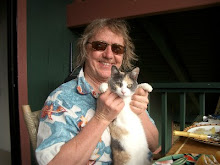Public Ethics, not 'Moral Chains'
This is a reflection on how Burke (mis)uses the phrase 'moral chains', implying that improving personal values is the solution to interpersonal conflict and necessary for sustainable societies.
The word 'moral' is so dang ambiguous, it can be measured by almost anything from personal integrity to religious creed to national honor. History shows that none of these are particularly successful means for achieving sustainable peace and justice beyond the scope of closed groups.
If you replace the phrase 'moral chains' with 'public ethics', it not only makes Burke's statement much more positive and inviting, it makes it much clearer in meaning and broader in scope, and more achievable as individuals without having to become 'purer' individually. It is unfortunate that Burke as well as other powerful and good thinkers including Chomsky, have often failed to make the important semantic distinction between ambiguous context-defined terms like 'morality' and 'values', and the term, 'ethics', which clearly means 'in the public space' and is not constrained to any particular moral value or creed.
There are huge impacts to understanding civil society hinges on something more than 'moral chains'. Defining the requirement as 'public ethics' creates an opportunity for solutions that do not depend on somehow learning to love each other better, or finding ways to cooperate or compromise on an adhoc basis with our immediate neighbors and tribes.
We can in fact support public ethics on any scale from the local neighborhood to worldwide, by recognizing our innate human love of fairness (which every child has from birth), and putting that above our love for strongly held born or chosen personal and group values.
Asking us to love fairness as well as winning is not particularly difficult, every sports lover does it, and so does every person glued to watching countless 'judge' and 'crime' focused TV shows. In fact, loving public ethics as well as personal values provides an 'out', a means for finding and supporting fair solutions without having to somehow learn to love other teams as much as our own. It allows us to maintain personal integrity and religious creeds in our personal and group lives, while supporting imperfect civil institutions for multilateral arbitration of differences in public decisions and activities. Nobody argues civil institutions and public ethics have ever been perfect, but they do achive some level of fairness - certainly far more than unilateral imposition of 'our' values (or somebody elses) or unilateral escalation of enforcement and violence.
If we think in terms of public ethics as well as personal values, we can fully support fairness and sustainable solutions in the public space while actually continuing to despise and hate other teams - other people's different born or chosen values in their personal and group spheres of activity. We don't have to learn to like anybody, or change our values in our personal space, just be mature citizens who recognize we can't always have our way in the public space.
Supporting ethical frameworks also offers opportunities for defining peace as arbitration of differences and enforcement of solutions via institutions for multilateral conflict resolution. These institutions and means including town boards, legislatures, police, judges, treaties, and coalition-based wars for example, which even at their worst are far more just and accomodate differences in values better than any unilateral solution.
Finally I'd add that pubic ethics very much applies to solutions to fair allocation of both shortages and surpluses, and application of science and other instruments of imperfect but fair arbitration to achieve sustainable human interaction and sustenance on a limited environment.
This means loving public ethics and letting it trump our personal values can and does in fact help to achieve civil societies and a world that is more sustainable and more peaceful, without having to look for solutions to arrive at a state of peace that is defined as somehow magically having no more conflicts.
Public ethics has a lot to offer, and this term should be part of discussions of every public issue and a foundation for conflict resolution. Appealing to people's innate love for fairness and asking their support for institutions of public ethics is the much simpler and more easily achieved path, compared to trying to change or find common ground between individual values. In fact it is public ethics alone that permits different individual and group values to continue to sustainably thrive in the personal space, alongside multilaterally arbitrated fairness and constraints in the public space.
So maintaining a fair and sustainable society and world does not depend on imposing some unilateral definition of Burke's 'moral chains', nor does it require that individuals change or compromose their personal behavior in their personal and group spheres of activity. It only requires being mature citizens and a bit less selfish when making decisions and interacting in the public space, based on a love of fairness. My belief is that's the only realistic and achievable type of solution. This is the core message of the enlightenment and the foundation of civil democracies.


0 Comments:
Post a Comment
<< Home